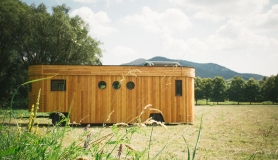MAKE IT LAST
Choose cookware and utensils that stand the test of time and won’t have to be thrown away with your leftover casserole. That means ditching the Teflon. The debate about the health hazards of non-stick surfaces continues, there are concerns about the chemicals used in the manufacturing process and how these substances are affected by heat. Besides the health concerns, there is no doubt that it has a limited useful life. Go for stainless steel or cast iron instead. Scanpan (scanpan.eu) make non-stick alternatives. Though a bit of an investment, a good cast iron skillet will last for generations – see lecreuset.co.uk. Buy high-quality knives that you can sharpen by hand, and use long-lasting cloths instead of kitchen roll.
LOVE YOUR APPLIANCES
Energy-efficiency upgrades are coming fast and furious to many new appliances. An efficient dishwasher, for instance, can use a lot less water than washing the dishes by hand in the sink. But before you jump the gun and make a hasty appliance purchase, however, first check to make sure that a repair isn’t in order. If the time has indeed come to get rid of an old appliance, note that many councils have take-back programs, helping you to properly dispose of these things, which likely contain hazardous chemicals and materials. When it does come time to replace your old-faithfuls look for the Energy Star rating, available for kitchen appliances including stoves, refrigerators, freezers, and dishwashers, then choose a sturdy model that will last.
DO IT YOURSELF
When cooking fresh meals at home rather than relying on preprepared food, you know exactly what is going in to your food, and, if you’re diligent about sourcing it, where it came from. This option also cuts out steps of your food’s lifecycle (and the associated energy in processing and transportation that comes from each step). If you have the space, take it a step further and grow your own fruits, vegetables, using your composted kitchen waste as fertilizer. Don’t stop the DIY train there, though: you can clean your counters and hand-wash dishes with white vinegar and bicarbonate of soda. Instead of shelling out for bottled water, get a filter pitcher or tap filter. The charcoalpeople.co.uk offer an innovative system.
BULK UP
Buy in bulk and cook in bulk; just make sure you can consume what you purchase and produce! Purchasing from the bulk bins mean less packaging, and fewer trips to the shops, and can also mean financial savings. Try infinityfoods.co.uk and suma.coop. Bulk cooking is a more efficient use of appliance energy and your time, (and a great excuse to throw a party), so cook up a nice big pot of soup and anticipate saving (and eating) lots of leftovers. And plan ahead; planning meals that can feed you and your family for a few days is a great way to shop efficiently and free up your precious leisure time.
ENERGY-EFFICIENT COOKING
“When cooking on the stove, using a properly sized pot for each of the stove burners also makes a difference”
When cooking on the stove, using a properly sized pot for each of the stove burners also makes a difference; on an electric stove, for example, an 18cm pan used on a 22cm hob wastes more than 40 percent of the burner’s heat. Make sure all of your pots and pans have close-fitting lids, then use them whenever possible including when you’re bringing boiled water up to temperature. Of course, the most energy efficient cooking means leaving heat out of the equation altogether - don’t forget about salads, chilled soups, and other dishes that require little prep and can be eaten cold. There’s a large niche culture growing around the idea of raw food - don’t be afraid to try something new!
BUY LOCAL
The food you bring in to your kitchen is just as important as the gadgets and appliances you have there, so buy local whenever you can. Food miles have risen near the top of ecofriendly food considerations, and the fewer miles from farm to table, the better. Organic grapes from Chile might taste good in the dead of winter, but consider the pollution caused by flying them to wherever you are. In addition, since they’re bereft of preservatives, biocides and many other nasties that inhabit conventional foods, organic foods can spoil more quickly, meaning that the longer your bunch of grapes is in transit, the less pristine its condition is likely to be. Whenever possible, we recommend supporting a community supported agriculture (CSA) co-op, buying from local farmers’ markets or purchasing directly from farmers themselves. Find local food producers at bigbarn.co.uk.
REMODELING? RECYCLE
Of course, making your old kitchen work for you is the greenest option of them all, but there comes a time when even the greenest folks need to upgrade or replace. If you are in the market for a new kitchen, turn first to salvage and antiques. They don’t make ‘em like they used to, so look for kitchen fittings, floors, paneling, and cabinets that have had a previous life are unique and have already stood the test of time. If you’re trading things out, be sure to offer them on Freegle.
GREEN KITCHENS CAN BE CLEAN KITCHENS
The list of what goes into regular petrochemically-based dishwashing liquids, detergents, floor and surface cleaners and other household cleaning products is enough to turn anyone’s stomach. Fortunately there are plenty of natural cleaning companies out there producing non-toxic, biodegradable, plant-based detergents. And you can always create your own cleaning products using everyday ingredients such as vinegar and bicarbonate of soda, which combine to make a great all-purpose, non-toxic cleaner.
WASTE NOT, WANT NOT
On average, the kitchen generates the most waste of any room in your house; for one of the main reasons, look no further at the excessive packaging on supermarket shelves. But fear not, it’s not as hard as it may seem to cut back on waste.
STEP ONE: refuse excessive packaging by taking your own bags, buying fresh, unwrapped produce, and thinking carefully about how the purchases you’re making are wrapped up.
STEP TWO: avoid over-sized portions; if you are regularly throwing food away then you are buying, and cooking, too much.
STEP THREE: reuse what you can, like old glass jars or bottles, bags, and packaging you can’t avoid.
STEP FOUR: compost uncooked organic waste (including cardboard and paper), and don’t fret if you don’t have a garden on which to spread your lovely waste. Many councils will gladly accept your compost. After all this, if there’s anything left over, be sure to swing by the recycling centre before tossing anything in the bin.
OUR PICK OF THE BEST NATURAL CLEANING PRODUCTS FOR THE KITCHEN
1. ALMA WIN HOUSEHOLD CLEANER, £3.90, PRAVERA.CO.UK
2. ORANGE MATE, £3.90, GREENBRANDS.CO.UK
3. WASHING-UP LIQUID, £2.10, BIODEGRADABLE.BIZ
4. E-CLOTH, FROM £5, E-CLOTH.COM
5. KITCHEN SURFACE CLEANER, £3.20, BENTLEYORGANIC.COM







